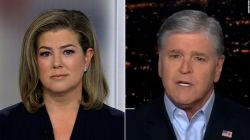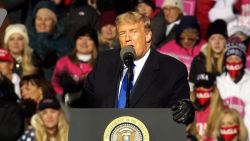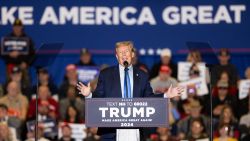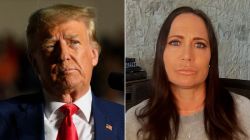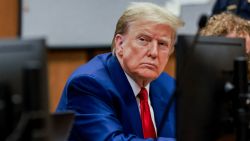Democrats launched a full-scale assault against Attorney General William Barr at Tuesday’s House Judiciary Committee hearing, clashing with Barr repeatedly as the hearing jolted from topic to topic.
Here are the top takeaways from Barr’s first appearance before the Judiciary panel in his 17-month tenure as attorney general.
Democrats were out for blood
House Judiciary Chairman Jerry Nadler of New York and the panel’s Democrats did not offer Barr any niceties congressional witnesses typically receive. Democrats repeatedly cut off Barr’s responses, accused him of being wrong or lying and made clear they weren’t interested in the explanations he was offering. Barr wasn’t allowed extra time at the end of each lawmaker’s five minutes to respond to questions that witnesses typically receive – forcing Republicans to use their time to let Barr push back on the Democratic accusations.
The effort was clearly part of a strategy from Democrats to show they had already rendered their verdict on Barr’s tenure as attorney general – and nothing he could say would sway that. Democrats charged that Barr was putting President Donald Trump’s interests ahead of the country, and they attacked the attorney general on his involvement in the prosecution of cases involving Trump associates, his response to police protests, his response to coronavirus, his removal of a US attorney and many more topics.
The final Democratic questioner, Rep. Veronica Escobar of Texas, accused Barr of refusing to uphold his oath and defend the Constitution, prompting ranking Republican Rep. Jim Jordan of Ohio to vocally protest the accusation while Nadler gaveled the hearing to a close.
Black lawmakers call out Barr
Some of the most powerful moments of Tuesday’s hearing came from Black Democrats on the panel, who questioned Barr’s assessments of systemic racism in policing and the response to nationwide protests following the killing of George Floyd at the hands of police in Minneapolis.
Rep. Sheila Jackson Lee, a Texas Democrat, urged Barr to recognize institutional racism in policing when he said he disagreed that it exists in police departments.
“I would hope that the DOJ would focus on systemic institutional racism,” Jackson Lee responded. “That’s what we need you to join us on, Mr. Attorney General, and to recognize that institutional racism does exist and until we accept that we will not finish our job and reach the goals and aspirations of our late iconic John Lewis.”
Louisiana Rep. Cedric Richmond called out Barr for invoking Lewis, the Georgia Democratic congressman who died earlier this month, in his opening statement while failing to have any Black people among his senior staff.
“That, sir, is systemic racism. That is what John Lewis spent his life fighting and so I would just suggest that actions speak louder than words and keep the name of the honorable John Lewis out of the Department of Justice’s mouth,” Richmond said.
The Louisiana Democrat also poked holes in Barr’s talking point that 11 White people and eight Black people were killed by police this year – noting that was actually a “glaring disparity” when only roughly 15% of the population in the US was Black.
GOP highlights attacks on police
Republicans had their own strategy going into Tuesday’s hearing: to show the attacks that have occurred against police officers.
Jordan ended his opening statement with a lengthy video splicing together descriptions of “peaceful protestors” with scenes of violence and rioting that have occurred in recent weeks, including attacks on police officers.
In questions, Jordan asked Barr at one point if St. John’s Church outside the White House would still be standing if not for the police response, and at another if the courthouse in Portland would be if federal officers weren’t protecting it. Republicans also questioned Barr on his comments that Antifa is a domestic terror threat while criticizing Democrats’ descriptions of Antifa and the protests.
Barr joined in on the criticism, questioning why Democrats weren’t condemning the violence.
“This intolerance in attacking people. I was very worried about that. And now we’ve seen it sweeping through the country like this. And I hope the Democratic Party takes a stand against the violence,” Barr said.
Barr says he’s independent but shows his political stripes
In his opening statement, Barr declared he was independent of Trump, but he also showed some political tendencies throughout the hearing.
Barr was pressed repeatedly on the government’s response to coronavirus, sidestepping questions on Trump’s action and inaction to combat the pandemic. When Rep. Debbie Mucarsel-Powell of Florida asked whether Florida GOP Gov. Ron DeSantis was doing an “incredible” job as Trump had said in March, Barr deflected by going after a Democratic governor instead.
“Did Cuomo do an incredible job?” Barr said of New York Gov. Andrew Cuomo.
Barr also blamed the Obama administration on Tuesday for the problems with Covid-19 testing, saying it was “a function of President Obama’s mishandling at the CDC.” It’s a false claim that’s been made by Trump and other Republicans – the initial faulty coronavirus test was developed this year.
And Barr’s explanation of his awareness of what the President wanted seemed to wax and wane during the hearing.
Asked about Trump’s tweets about Roger Stone – in which Trump attacked the Stone sentencing recommendation hours before Barr pushed for a lower recommendation – Barr said he did not read the President’s tweets.
“At that point I learned about the President’s tweet because I don’t monitor the President’s tweets,” Barr said.
Later, Barr said of the President’s tweets, “I don’t pay attention to that. Unless they’re brought to my attention.”
Of course, Barr previously said Trump’s tweets feed a much bigger role in his day-to-day responsibilities, saying in a February interview after the Stone decision that the President’s tweets “make it impossible for me to do my job.”
Barr defended his actions with Stone and in the decision to drop charges against Michael Flynn, Trump’s first national security adviser. And Barr defiantly challenged his critics to show him one instance where one of Trump’s political enemies had been indicted.
Of course, while the Justice Department has not indicted Trump’s enemies, prosecutors are investigating Trump’s opponents and critics from the Obama administration, including the probe of the FBI’s Russia investigation led by US Attorney John Durham that’s scrutinizing former Director of National Intelligence James Clapper and CIA Director John Brennan.
The Justice Department has guidelines against taking actions that could influence an election. Barr on Tuesday declined to commit to refraining from issuing Durham’s findings before November 2020.
Barr’s dubious voting claims
Another key instance where Barr has backed up Trump is on voter fraud tied to mail-in voting, which Trump has falsely claimed will lead to massive fraud and a rigged election. Barr said at the Tuesday hearing that a full vote-by-mail election has a “high risk” of significant voter fraud.
But those claims wilted under closer scrutiny. When Rep. Mary Gay Scanlon, a Pennsylvania Democrat, asked Barr to provide evidence that mail-in voting risked of foreign countries producing counterfeit ballots, one of the key allegations Barr has made about fraud, Barr could not do so.
“No I don’t, but I have common sense,” Barr said.
Barr struggled with other election-related questions, too, saying he hadn’t looked into whether Trump could move the date of the election and initially answering it “depends” when asked if it was appropriate for presidents to accept foreign election assistance. After a second attempt, he said it was never appropriate.
Asked what he would do if Trump lost the election but refused to leave office – a scenario Democrats have raised and Trump has stoked by refusing to say he will accept the election results – Barr caveated his answer: “If the results are clear, I would leave office.”
CORRECTION: This story has been updated to correct the language around US racial demographics cited by Rep. Cedric Richmond during the hearing in reference to Americans killed by police this year. According to the latest available Census data, the US is roughly 75% white and 15% Black.












